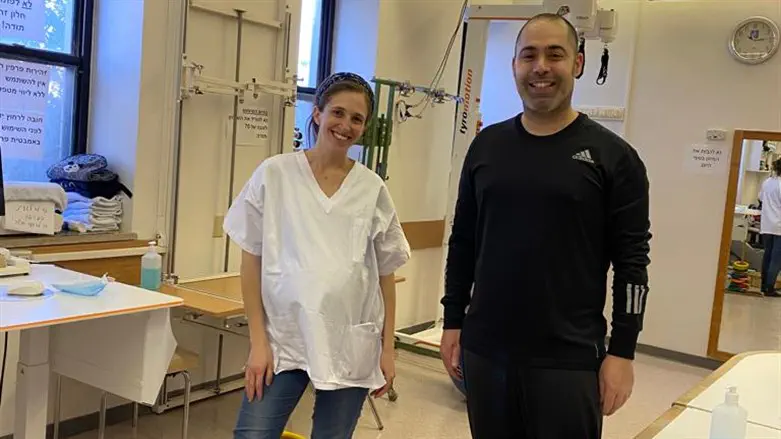
The moment when 41-year-old Nir Levy from Jerusalem collapsed was a shocking event that he did not expect at all and changed his life. "It all started over eight months ago when I had an upset stomach" says Levy, "I didn't attribute much importance to it.
Everyone goes through such an event during their lifetime. But after a few days, I began to feel that the muscles in my legs and hands were less functional. I thought I had pulled some muscles. I walked more slowly. Basic actions such as opening a drawer, brushing my teeth and eating, suddenly became more challenging.
I had a consistent deterioration, but my brain still didn't perceive that something big was happening. Several times, I went to my sick fund clinic for a check-up. Each time there was no diagnosis of anything that required immediate treatment," he says.
"The simplest actions became more complex, until the day I collapsed. I collapsed like a tower of cards and couldn't get up. I was taken by ambulance to Hadassah Ein Kerem Hospital, where my life changed radically. Suddenly, in the middle of my life, at the peak of my career, I became a nursing patient. I lay in bed unable to walk and get up, literally paralyzed. I was connected to a monitor and fluids."
"In the emergency room at Hadassah Hospital, I first heard that I had a suspected rare autoimmune disease and underwent numerous tests. I was then officially informed that I had been diagnosed with an autoimmune disease called Guillain-Barre syndrome, a severe multi-nerve infection. It is impossible to explain how traumatic this diagnosis is and puts everyone in shock. We were stunned and I was very scared that I would never in my life walk again on my feet.”
Prof. Mark Gutkin, a senior neurologist in the Department of Neurology who heads the neuro-muscular field and ALS clinic at Hadassah, says: "Nir came to us with clear symptoms of Guillain-Barre syndrome. This is a rare autoimmune disease in which the immune system attacks the peripheral nervous system of the body, damaging nerve function and can cause widespread paralysis throughout the body and damage to the sensory system.
In many cases, the disease appears after an infectious disease such as a routine throat infection or even as in Nir’s case - indigestion," emphasizes Prof. Gutkin. "The first signs are weakness in the lower extremities and then paresthesia, rarely it starts from the face area in the hands. In most cases the disease usually worsens within a few days to a few weeks. There are cases in which we see, within a few days, a significant worsening that causes very significant limb paralysis. The greatest danger is in paralysis of the respiratory muscles."
"The most important thing is to recognize the disease. If there is a suspicion of the possibility of the disease, a neurological clinical diagnosis should be made quickly. For us, a neurological examination is one of the most important tools for diagnosing the disease."
"There are quite a few cases in which, unfortunately, the disease progresses quickly and people arrive for treatment a little too late. The disease can become complicated, damage the respiratory tract or even the functioning of the heart and put the patient in a life-threatening situation. Rapid identification of the disease and proper treatment prevents the deterioration of the disease. Most patients, following rehabilitation, return to normal functioning."
Nir was treated at Hadassah in a procedure known as "plasmapheresis", during which he was connected to a machine through which his blood was sucked out, separated from the plasma fluid that composes it, and returned to the body without the defective plasma.
The blood cells that were returned to the body naturally produce new, healthy plasma, instead of the plasma that was removed. After the treatment, he has a long and arduous way to go in restoring the abilities he lost – through intensive rehabilitation and with determination, both his and that of the rehabilitation staff at Hadassah Mount Scopus.
"From the bottom of my heart, I would like to thank the staff who treated me and brought me back to the person I was before the upheaval I went through," says Nir excitedly, “and to the staff at the Hadassah Ein Kerem emergency room, to the doctors who were called and made the diagnosis of the disease with very impressive professionalism. I have no doubt that the prompt and rapid treatment halted the disease and brought about ongoing improvement every day."
"I was hospitalized in a place with the most professional, sensitive and dedicated team of doctors and nurses who showed how medicine in Israel is the best in the world. The rehabilitation I am undergoing at Hadassah Mount Scopus Hospital is amazing and the progress towards full recovery is already here. I'm already walking on my feet! It is a great pride that these are the medical teams working in the hospitals in the state of Israel."

